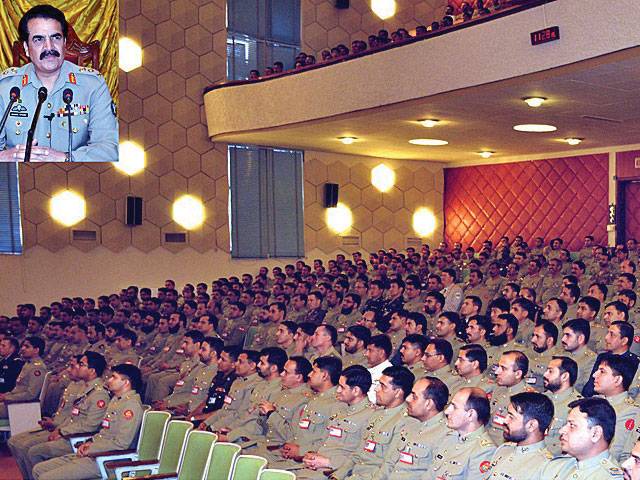ISLAMABAD - Chief of Army Staff General Raheel Sharif Thursday said that noteworthy achievements in operation Zarb-e-Azb have created a space for a decisive surge against terrorists in urban areas.
Addressing officers and students of Command and Staff College during a day’s visit to the institute in Quetta, he said that only a secure Pakistan can be a prosperous Pakistan.
The army chief, who was received by Commander Southern Command, Lt-Gen Naseer Khan Janjua upon his arrival, said “our fight against terrorism and extremism is not for today only but for our future generations”. He said wars are not fought by armies alone; rather, it requires collective efforts on part of the whole nation.
“Our security threats are complex, multidimensional and hybrid in character. Traditional response mechanisms are therefore not relevant anymore,” the army chief said. He said that owing to achievements in Zarb-e-Azb the environment is getting ripe for political optimisation towards a meaningful and sustainable closure.
The statement comes a day after Interior Minister Chaudhry Nisar conceded the arrest of attackers of a bus carrying Ismaili community members in which 45 people were killed near Karachi’s Safoora Chowrangi. The horrific incident had prompted General Raheel to cancel his official visit to Sri Lanka and he dashed to Karachi to take stock of the situation in the port city.
A day after the incident, a crucial meeting of the provincial apex committee was held in which apart from senior Sindh government officials, General Raheel Sharif, senior military officials and officials of intelligence agencies participated. Gen Raheel vowed in that meeting to continue “across the board operations” at an increased tempo and hunt down terrorists who commit heinous acts.
NWA airstrikes kill 15 militants
Reuters adds: Airstrikes killed at least 15 suspected militants in Shawal Valley on Thursday, intelligence officials said, a week after security forces moved in on Taliban strongholds there.
The deeply forested ravines of the valley are a key smuggling route between Pakistan and Afghanistan, and are dotted with Taliban bases used as launch pads for attacks on forces.
In the latest airstrikes, a local security commander and two intelligence officials said that 15 or 16 suspected militants were killed in the Datta Khel area of North Waziristan.
The Taliban used to control all of North Waziristan, a mountainous region that includes the Shawal Valley and runs along the Afghan border. But the Pakistani military launched an operation there last June and has recaptured most of it.
Nato forces had long urged Pakistan to carry out such an offensive, saying Taliban safe havens in Pakistan were being used to attack Nato and Afghan forces in Afghanistan.
Now locals believe that the military is gearing up for an operation in Shawal Valley, where the Taliban still freely operate.
The area is a stronghold of Khan ‘Sajna’ Said, a leader of a Taliban faction whose name was added to a sanctions list of “specially designated global terrorists” by US authorities last year. There have been a number of airstrikes in the Shawal Valley over the past week and two drone attacks, but no sign of a large ground offensive.
Most phone lines to the area have been cut and military roadblocks curtail civilian movement.
Saturday, April 20, 2024
Traditional responses to threats irrelevant: COAS
| Says Zarb-e-Azb paved way for clearing urban areas of terrorism

Policitising Tragedy
April 20, 2024
Tehran to Rafah
April 20, 2024
A New Leaf
April 20, 2024
A Tense Neighbourhood
April 19, 2024
Dubai Underwater
April 19, 2024
Dangers of Deepfakes
April 20, 2024
Feudalism
April 20, 2024
Kite tragedy
April 19, 2024
Discipline dilemma
April 19, 2024
Urgent plea
April 19, 2024
ePaper - Nawaiwaqt
Advertisement
Nawaiwaqt Group | Copyright © 2024





